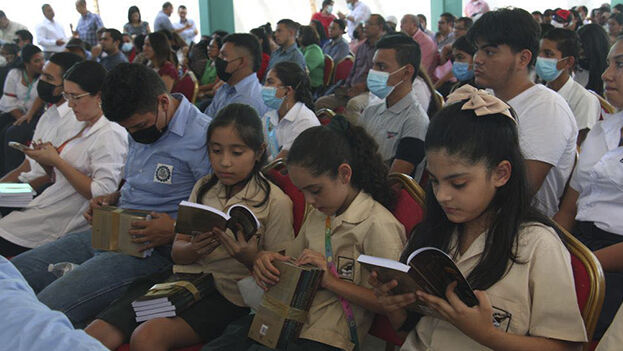
![]() 14ymedio, Havana, 13 January 2023 — The National Party of Honduras (PNH) described the hiring of 123 Cuban professionals in Education by the Government of Xiomara Castro as ideological interference. The opposition denounced that the objectives are “doubtful” and questioned the lack of transparency in the disclosure of the terms of the contracts.
14ymedio, Havana, 13 January 2023 — The National Party of Honduras (PNH) described the hiring of 123 Cuban professionals in Education by the Government of Xiomara Castro as ideological interference. The opposition denounced that the objectives are “doubtful” and questioned the lack of transparency in the disclosure of the terms of the contracts.
The Honduran government signed a three-year agreement with the Cuban Ministry of Education on December 27 to “refound” the educational system of the Central American country. In a statement by the PNH bench, published on January 5, it was pointed out that this alliance is “opaque, not very transparent and with dubious pedagogical objectives.”
The bench questioned why the Cuban teachers will travel to the 298 municipalities, if the Honduran Ministry of Education assures that the professionals will only “advise” the ministerial cabinet. “This is illogical,” it clarified, at the time that it insisted that the doubts of different sectors of society “are obvious.” “There are many demands from Latin American countries about Cuba’s political and ideological presence on the continent, which uses health and education as a pretext for its purposes,” it added.
For the opposition party, there are enough pedagogues and teachers “with enormous experience” who can support the Ministry of Education to promote an efficient program to eradicate illiteracy, which affects 12% of the Honduran population. Also questioned was the fact that the Honduran government has not disclosed the profiles of Cuban professionals on its transparency portal when there is a history of “shady agreements” between the “dictatorial and repressive regime” of Havana in countries of the region, such as Mexico, Costa Rica and Brazil.
In its position, it concluded that the “Honduran people must be alert to stop Cuba’s interference.” “The 40 million (lempiras, equivalent to 1.6 million dollars) that the Government says will be allocated to pay the Island for the teachers should be an investment in hiring national teachers and repairing the educational infrastructure.”
The Tegucigalpa authorities have defended the agreement arguing that [Cuba’s] is one of the “best” educational systems in the world and that it will allow Honduras to achieve an equal one, “universal, inclusive, participatory, secular and scientific,” according to a promotional video published on government networks after the signing of the memorandum.
Before this agreement, Cuba and Honduras had another agreement to advise the national literacy plan, known as “Yo Sí Puedo” [Yes I can], which generated a wave of criticism from the opposition. The Honduran Vice Minister of Education, Edwin Hernández, insisted in August 2022 that the Cuban professionals will not give classes and will only dedicate themselves to developing the program, whose beginnings date back to the administration of former President Manuel Zelaya.
With the coming to power of Xiomara Castro, Zelaya’s wife, there were new rapprochements between her government and Cuba. In July 2022, a memorandum of understanding was signed to strengthen bilateral relations between the two nations, which opens the doors to “traveling on new paths” of collaboration in the fields of science, technology, literacy, and the exchange of scholarships, the Honduran Minister of Foreign Relations, Eduardo Enrique Reina said at the time.
The export of professional services – above all, doctors and teachers – is the main source of foreign currency for the Government in Havana, which has been the subject of numerous complaints from international organizations for appropriating most of the wages of its aid workers sent abroad.
The most recent data on the international missions of Cuban teachers dates from 2013, when there were 2,326 teachers placed in different countries. The largest group was in Venezuela, with 423, followed by Equatorial Guinea, with 221, and Angola, with 219.
____________
COLLABORATE WITH OUR WORK: The 14ymedio team is committed to practicing serious journalism that reflects Cuba’s reality in all its depth. Thank you for joining us on this long journey. We invite you to continue supporting us by becoming a member of 14ymedio now. Together we can continue transforming journalism in Cuba.
